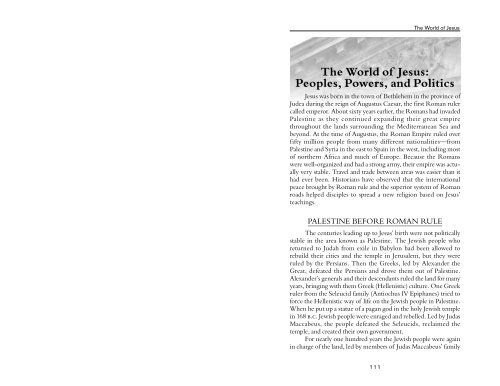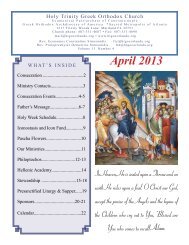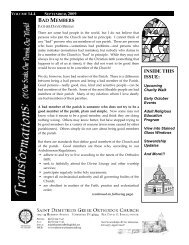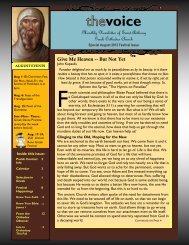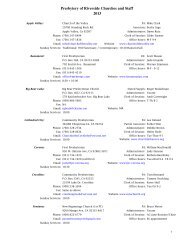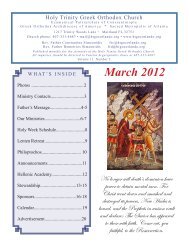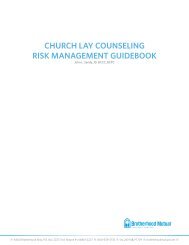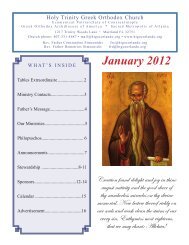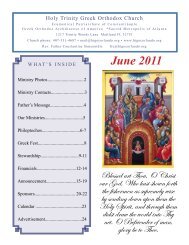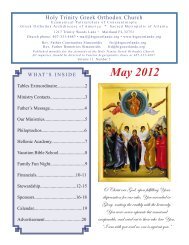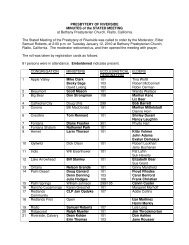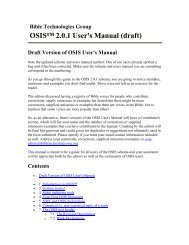The Life of the Christ - ForMinistry
The Life of the Christ - ForMinistry
The Life of the Christ - ForMinistry
Create successful ePaper yourself
Turn your PDF publications into a flip-book with our unique Google optimized e-Paper software.
111<br />
<strong>The</strong> World <strong>of</strong> Jesus<br />
<strong>The</strong> World <strong>of</strong> Jesus:<br />
Peoples, Powers, and Politics<br />
Jesus was born in <strong>the</strong> town <strong>of</strong> Bethlehem in <strong>the</strong> province <strong>of</strong><br />
Judea during <strong>the</strong> reign <strong>of</strong> Augustus Caesar, <strong>the</strong> first Roman ruler<br />
called emperor. About sixty years earlier, <strong>the</strong> Romans had invaded<br />
Palestine as <strong>the</strong>y continued expanding <strong>the</strong>ir great empire<br />
throughout <strong>the</strong> lands surrounding <strong>the</strong> Mediterranean Sea and<br />
beyond. At <strong>the</strong> time <strong>of</strong> Augustus, <strong>the</strong> Roman Empire ruled over<br />
fifty million people from many different nationalities—from<br />
Palestine and Syria in <strong>the</strong> east to Spain in <strong>the</strong> west, including most<br />
<strong>of</strong> nor<strong>the</strong>rn Africa and much <strong>of</strong> Europe. Because <strong>the</strong> Romans<br />
were well-organized and had a strong army, <strong>the</strong>ir empire was actually<br />
very stable. Travel and trade between areas was easier than it<br />
had ever been. Historians have observed that <strong>the</strong> international<br />
peace brought by Roman rule and <strong>the</strong> superior system <strong>of</strong> Roman<br />
roads helped disciples to spread a new religion based on Jesus’<br />
teachings.<br />
PALESTINE BEFORE ROMAN RULE<br />
<strong>The</strong> centuries leading up to Jesus’ birth were not politically<br />
stable in <strong>the</strong> area known as Palestine. <strong>The</strong> Jewish people who<br />
returned to Judah from exile in Babylon had been allowed to<br />
rebuild <strong>the</strong>ir cities and <strong>the</strong> temple in Jerusalem, but <strong>the</strong>y were<br />
ruled by <strong>the</strong> Persians. <strong>The</strong>n <strong>the</strong> Greeks, led by Alexander <strong>the</strong><br />
Great, defeated <strong>the</strong> Persians and drove <strong>the</strong>m out <strong>of</strong> Palestine.<br />
Alexander’s generals and <strong>the</strong>ir descendants ruled <strong>the</strong> land for many<br />
years, bringing with <strong>the</strong>m Greek (Hellenistic) culture. One Greek<br />
ruler from <strong>the</strong> Seleucid family (Antiochus IV Epiphanes) tried to<br />
force <strong>the</strong> Hellenistic way <strong>of</strong> life on <strong>the</strong> Jewish people in Palestine.<br />
When he put up a statue <strong>of</strong> a pagan god in <strong>the</strong> holy Jewish temple<br />
in 168 b.c. Jewish people were enraged and rebelled. Led by Judas<br />
Maccabeus, <strong>the</strong> people defeated <strong>the</strong> Seleucids, reclaimed <strong>the</strong><br />
temple, and created <strong>the</strong>ir own government.<br />
For nearly one hundred years <strong>the</strong> Jewish people were again<br />
in charge <strong>of</strong> <strong>the</strong> land, led by members <strong>of</strong> Judas Maccabeus’ family


